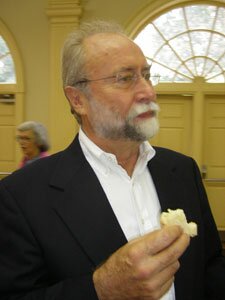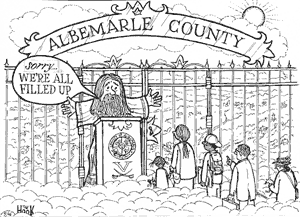NEWS- ZPG? Has Albemarle population maxed out?
No-growthers want the Albemarle Board of Supervisors to identify an optimal, sustainable population for the county, a request that has critics questioning the legality and benefits of such a plan in an area where housing costs already prevent many workers from living here.
Advocates for a Sustainable Albemarle Population went before the supes September 13, the same night the board tabled two other highly touted growth tools– phasing and clustering– because of a 3-3 split.
ASAP was joined by the Sierra Club and Citizens for Albemarle– but not the other major enviro org, Piedmont Environmental Council– in making its proposal to amend the county's comprehensive plan and its plea that the county not change existing zonings in the meantime.
"Identification of an optimal population size isn't part of the planning process," says ASAP founder Jack Marshall, who scoffs at the notion that growth is inevitable, calling that an "oversimplified myth."
At a press conference flanked by ASAPers Francis Fife, a former Charlottesville mayor; Rich Collins, a UVA environmental prof; and Crozet activist Tom Loach, Marshall asked how big Albemarle wants to grow past its current 130K combined population with Charlottesville.
"Do we want 150,000, 200,000, 500,000?" he queried. "We think it's important to answer that question."
Marshall invited local groups "assumed, perhaps falsely, to favor growth"– the Chamber of Commerce, the Blue Ridge Homebuilders Association, and the Thomas Jefferson Partnership for Economic Development– to join in the discussion because, he says, those groups love Albemarle as much as ASAP does.
"We are opposed to it," says Jefferson Area Libertarian Chairman John Munchmeyer, who helped torpedo phasing and clustering laws with ads in the Daily Progress. "The true purpose of government is to protect our rights. Implementing this proposal would violate rights. And it is simply wrong to say, 'I live in this beautiful place, but no more can share it.'"
Munchmeyer adds, "The people who are advocating this should stop attempting to use government force to promote their agendas. That always results in having the opposite effect and/or developing unforeseen negative consequences. They should attempt to persuade instead of using government force."
"It's totally unrealistic," says pedestrian activist Kevin Cox. "The net impact is higher costs for those least able to afford them. Many people who work at the university can't afford to live here."
Cox is particularly peeved that the Sierra Club endorsed the ASAP proposal. "I don't understand the Sierra Club's reasons for supporting this," he says. "It's not helpful to push people farther out."
And Cox calls the whole notion of a sustainable population for Albemarle "preposterous," pointing out that the county currently is not sustainable. "We're part of Virginia, part of the United States– we're not independent little Switzerland," he says.
"Local governments do not have the ability to set population limits," notes Board of Supervisors Chair Dennis Rooker. "We can't keep people from moving here."
What the supervisors can do is control land use. "In broad strokes, you can establish population ranges through zoning," says Rooker. "It's a blunt tool, not a precise tool."
Rooker says he sympathizes with ASAP's request. "I personally feel the exercise would be an important one to go through to focus on population and its impact on the community," he says.
But with the board evenly split over requiring phasing and clustering, the ASAP proposal likely would remain an exercise.
Rooker admits disappointment that the two tools did not have the votes to become law, even though, he says, the board unanimously approved adding them to the comprehensive plan.
"They were the most important two strategies in the board's strategic plan adopted a year ago," Rooker says.
Supervisors Lindsay Dorrier, Ken Boyd and David Wyant were the no-phasing/clustering faction. "It's a loss of property rights," explains Wyant. "Most of my constituents are against it because it affects property rights."
What does that mean for the ASAP plan?
"I think it's a discussion we should have," says Wyant. "I do agree we ought to be controlling growth with the resources we have in the rural area, such as adequate water supply or septic system. Are the resources there to handle it?"
Collins predicts a "vigorous debate."

ASAP founder Jack Marshall wants Albemarle to hire outside consultants to determine the county's optimal population.
PHOTO BY JOEY SMITHERS

#
1 comment
The politicians and we, the voters, need to connect the dots on expansion...not the vestigial rationales and skewed hype, which only mislead and cost us.
The dots are ultimately linked to our pocketbooks and the choices we make with a limited amount of income. In terms of Charlottesville/Albemarle growth, all we need ask is 'what are the total costs of expansion'. The costs are not just this project or that, per se, but the associated costs of roads, water, sewage treatment, and quality of life.
Too often the benefits of expansion are pitched without cost per taxpayer accounting, i.e., taxes, fees, tariffs, licensing etc. that are socialized costs and socialized supports of development costs. In the few cases where a cost is mentioned, it is limited to the immediate figures--a de facto cover up of necessary associated costs [also from our pocketbooks] to support a developmnet.
We voters fail to connect the dots because these costs are often hidden. But...the costs surface and hit us in terms of paying more for everything than we did before but without any incremental benefit.
These socialized incremental develpment costs take away our earned income that could be used by each citizen elsewhere, whether it be the kids college fund, the vacation cruise, charity donations, paying off the bar bill, etc.